
"Dancing in the Street" is a song written by Marvin Gaye, William "Mickey" Stevenson and Ivy Jo Hunter. It first became popular in 1964 when recorded by Martha and the Vandellas whose version reached No. 2 on the Billboard Hot 100 chart and peaked at No. 4 in the UK Singles Chart. It is one of Motown's signature songs and is the group's premier signature song. A 1966 cover by the Mamas & the Papas was a minor hit on the Hot 100 reaching No. 73. In 1982, the rock group Van Halen took their cover of "Dancing in the Street" to No. 38 on the Hot 100 chart and No. 15 in Canada on the RPM chart. A 1985 duet cover by David Bowie and Mick Jagger charted at No. 1 in the UK and reached No. 7 in the US. The song has been covered by many other artists, including The Kinks, Tages, Black Oak Arkansas, Grateful Dead, Little Richard, Myra and Karen Carpenter.

"I'll Be Doggone" is a 1965 song recorded by American soul singer Marvin Gaye and released on the Tamla label. The song talks about how a man tells his woman that he'll be "doggone" about simple things but if she did him wrong that he'd be "long gone". The song was written by Miracles members Smokey Robinson, Pete Moore and Marv Tarplin, initially for The Temptations, who rejected the song.

Tages were a Swedish rock band formed in Gothenburg in 1963. The group, whose original line-up consisted of Tommy Blom, Göran Lagerberg, Danne Larsson, Anders Töpel and Freddie Skantze, were one of the most successful Swedish bands of the 1960s. They achieved thirteen top-20 singles on Kvällstoppen, such as "Sleep Little Girl", "I Should Be Glad", "In My Dreams", and "Miss Mac Baren", as well as having two albums certified gold, Tages (1965) and Tages 2 (1966).

Tommy Albert Blom was a Swedish singer, songwriter and musician. He was a member of the band Tages in the 1960s.
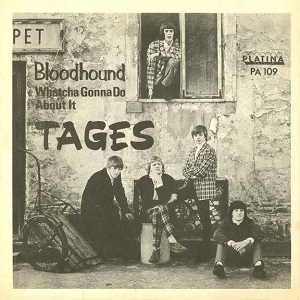
"Bloodhound" is a song, initially written and performed by soul singer Larry Bright in 1961. Initially performed as a rhythm and blues song, it quickly garnered a reputation as a garage rock song following a cover by British rock band Downliners Sect. The most well-known and commercially successful rendition of the song was recorded by Swedish rock band Tages in 1965, who charted on both Tio i Topp and Kvällstoppen with their garage rock version of it.
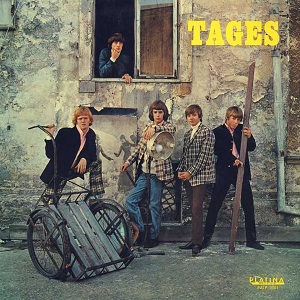
Tages is the debut studio album by the Swedish rock band Tages, released on 3 November 1965 on Platina Records. Released during a period in which the band had accumulated four top ten singles in Tio i Topp and as many on Kvällstoppen. This led the band to become one of Sweden's first and foremost pop groups, along with Hep Stars.
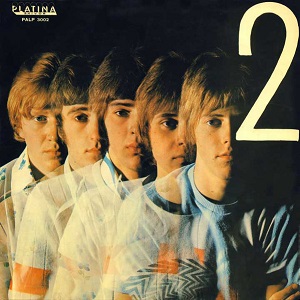
Tages 2 is the second studio album by the Swedish rock band Tages, released on 4 August 1966 by Platina Records. Often considered their artistic breakthrough, six out of twelve tracks are original compositions.
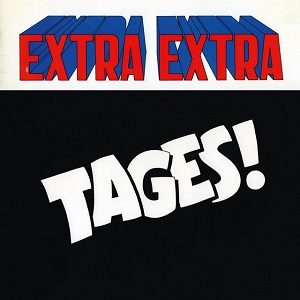
Extra Extra is the third studio album by the Swedish rock band Tages, released on 28 November 1966 by Platina Records. Their third and final album on Platina, it was issued only four months after their second studio album Tages 2. The album was largely recorded during a period in which the band had started evolving into a psychedelic rock group, something that became evident on their two final efforts, Contrast and Studio. The album was recorded during a period in which Tages underwent several lineup changes. It's their first effort not to feature drummer Freddie Skantze, who left following the recording of Tages 2, and is the second and final album with drummer and vocalist Tommy Tausis, who'd played on several tracks on Tages 2. He left following the recording of Extra Extra, and was replaced by Lasse Svensson

"Sleep Little Girl" is the debut single by the Swedish rock band Tages. It was written by Tommy Blom and released on 16 October 1964. The initial recording was made at a Youth center at Nylöse, a neighborhood of Gothenburg, Sweden's second biggest city, and the song has professionally been re-recorded in a studio twice.
"Crazy 'Bout My Baby" is a song first written and recorded by musician Robert Mosley in 1963. His third solo single, it failed to chart, leading to it becoming his final single released. Initially an obscure single, it was brought to light by mainstream acts such as The Swinging Blue Jeans and Tages, the latter of which charted in Sweden with it.

Tages formed in May 1963 as a duo and quickly expanded into quintet, though no music by them would be released until more than a year later, when their debut single "Sleep Little Girl" was released in October 1964. Up until October 1968, 23 singles by the group were released, though six of those were unauthorized. Out of these singles, 13 managed to reach both Kvällstoppen and Tio i Topp while two further singles only reached Tio I Topp. In 1969, the band changed their name to Blond and three further singles were released between July 1969 and July 1970, out of which one reached Tio i Topp. Combined under both names, the band released in total 27 singles between October 1964 and July 1970.
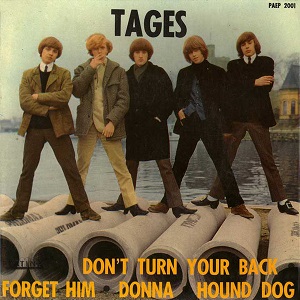
Tages is the first seven-inch extended play by Swedish rock group Tages, a release which features four songs, two of which showcase the early songwriting talent of the band. It was initially released on 4 June 1965 in 1000 copies on Platina Records.

"Don't Turn Your Back" is a song written by bass guitarist Göran Lagerberg and guitarist Anders Töpel, first recorded by their band Tages in 1965. Produced by the Violents Rune Wallebom, the song would be featured as the lead track from their debut EP Tages released three weeks later

"I Should Be Glad" is a song by the Swedish rock band Tages, written by bassist Göran Lagerberg and rhythm guitarist Danne Larsson in 1964. Following bad press for their debut single "Sleep Little Girl", the group quickly recorded a follow-up which critics would consider good.

Göran Bertil Lagerberg is a Swedish musician and singer-songwriter, best known as the bass guitarist and co-lead vocalist in Swedish rock band Tages and later progressive rock act Kebnekajse. In the 1990s, he was a member of supergroup Grymlings together with Magnus Lindberg, Pugh Rogefeldt and Mikael Rickfors.
Platina Records was a Swedish independent record label founded in 1964 by businessman and songwriter Evert Jakobsson. The label saw great success throughout the mid-1960s with rock acts such as Tages, before turning to dansband music in the 1970s, gaining success with Flamingokvintetten and Thorleifs. After turning to pay to play in 1984, the label shut down in 1989.

"The One for You" is a song written by Swedish guitarist Danne Larsson and recorded by his group Tages in 1965. Following an intensive tour of the Sweden, while also previously having composed songs for the band, Larsson wrote the song inspired by their trip to London, allegedly about a girl he had met there. It was the first recording by Tages produced by Anders Henriksson, who would come to produce the majority of their coming output, along with being their first single recorded at Europafilm Studios in Bromma, Stockholm.

Tom & Mick were a Swedish band formed in 1965 in Enköping, Sweden. They were only active for three years though managed to release an album and a handful of singles, of which "Please, Please, Please" became their first hit. During their last two active years, they were fronted by Tommy Körberg (Tom) and Michael Johansson (Mick), one of the first dual-vocalist pop groups in Sweden at the time Retrospectively, they are best known for their single "Somebody's Taken Maria Away" which topped the Swedish charts, and for starting the career of Körberg, who would go on to become one of the most well known musicians in Sweden.
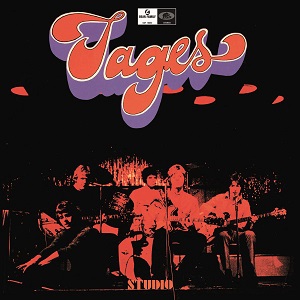
Studio is the fifth studio album by the Swedish rock band Tages, released on 4 December 1967 on Parlophone in Sweden. Following the success of their album Contrast, Tages began working on their follow-up to it. Hampered by a long summer tour, the album was largely recorded between October and November 1967 with sessions spanning all the way back to April. It was primarily recorded at Europafilm Studios in Bromma, Stockholm with Anders Henriksson producing. The band took a break in recording the album in October for a tour of England organized by Parlophone, which allowed them access to EMI Studios in London, where two of the album's tracks were recorded. One single was released from the album, "She's Having a Baby Now" and the sessions also produced the non-album single "Treat Her Like a Lady".

Contrast is the fourth studio album by Swedish pop band Tages, released on 28 April 1967 through Parlophone Records. Contrast was preceded by a tumultuous period in Tages' career, in which drummer Tommy Tausis left the band for the Spotnicks only days before recording commenced. The album is the first to feature Tausis' replacement Lasse Svensson, who would stay with the group until 1969. It was also Tages' first album to be released through Parlophone, following three albums by independent record label Platina. Parlophone guaranteed Tages free studio time, resulting in the sessions for Contrast.


















